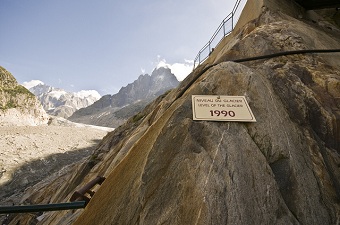Why the next hot spot isn't Asia but the Arctic
 Climate change is not only wreaking havoc on our weather. It is also rapidly melting the world’s glaciers, opening up access to previously inaccessible minerals, oil and gas.
Climate change is not only wreaking havoc on our weather. It is also rapidly melting the world’s glaciers, opening up access to previously inaccessible minerals, oil and gas.And that, in turn, is setting off political jockeying among the world’s superpowers to see who will have access to them, the New York Times reports.
For instance, Greenland, long a backwater of diplomacy, is suddenly finding itself courting the likes of Secretary of State Hillary Clinton, South Korean President Lee Myung-bak and officials from the European Union and China. The country is sitting on deposits of rare earth metals that are used in technologies such as cell phones.
China, in particular, is pushing to increase its influence in the region, because it lacks actual Arctic territory, unlike the United States, Russia and several European Union nations, whose Arctic territories give them a vote on the Arctic Council. It would like to have a say in decisions on minerals and shipping, because its economy depends on exports, and the newly navigable polar routes are cheaper and faster to use for shipping, compared to the Suez Canal.
China, the European Union, Japan and South Korea have all applied for permanent observer status on the Arctic Council, the eight-country governing body that develops the region’s policy; while such status would not grant them the right to vote, they would be able to present their perspective.
Although there hasn’t been much actual exploration of Arctic resources, that will likely be ramped up quickly. Climate change is melting the glaciers more rapidly than scientists and climate models predicted. If the melting continues at this rate, Arctic waters could be ice-free by 2020.
So, although there is just one working mine in Greenland, 100 new sites are being mapped out. And gas companies are able to explore for longer periods in the summer because warmer weather has lengthened the working season by a month.
The Arctic Council will vote in February to decide which countries receive permanent observer status, but the Chinese are already starting to invest in the region: Chinese firms have acquired interest in two Canadian oil companies that could give them access to Arctic oil drilling, and they’ve begun financing the development of gem and mineral mines in Greenland.
You can return to the main Market News page, or press the Back button on your browser.

